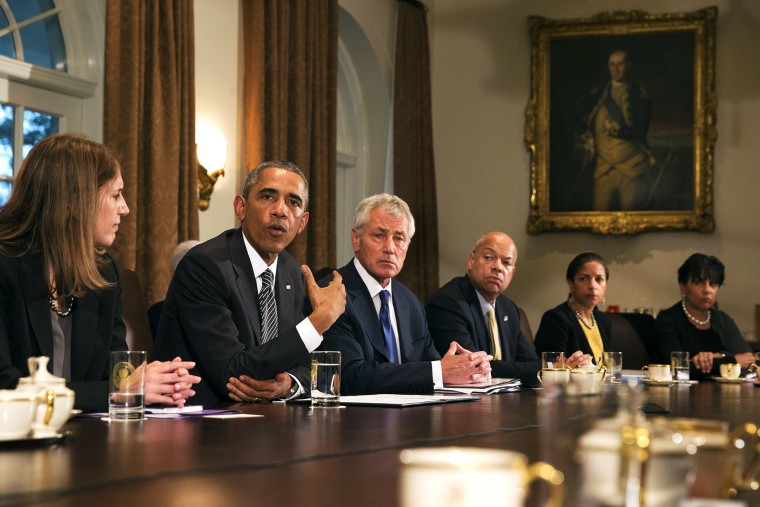The United States must monitor Ebola "in a much more aggressive way," President Barack Obama said Wednesday, following a tumultuous series of events that exposed gaps in the government's strategy to halt the disease's deadly march.
Speaking after a two-hour cabinet meeting at the White House — which included the vice president, secretary of defense, attorney general, and secretary of health and human services, among other participants — Obama said he had directed the Centers for Disease Control and Prevention (CDC) to have a rapid response team immediately on site in the event that future Ebola cases are diagnosed. He also stressed the need for disposal to be completed properly and protocols followed to the letter. Airport screenings should continue, Obama added, as should the focus on stopping the Ebola epidemic at its source in West Africa.
"Bottom line in terms of the public, I want people to understand the dangers of contracting Ebola, of a serious outbreak are extraordinarily low," said Obama. "But we're taking this very seriously."
Obama cancelled campaign trips to New Jersey and Connecticut Wednesday so that he could convene an emergency meeting of Cabinet officials at the White House to discuss the government's Ebola response. On Wednesday night, the White House also announced that the president was scrapping his Thursday travel plans for Rhode Island and New York in order to continue monitor the developing crisis.
Earlier in the day, a second health care worker in Dallas tested positive for Ebola following her involvement in the treatment of Thomas Eric Duncan, a Liberian resident who became the first person diagnosed with the deadly disease on U.S. soil.
Duncan passed away exactly one week ago. Since then, two of his nurses — 26-year-old Nina Pham, who tested positive for Ebola on Sunday, and 29-year-old Amber Vinson, who test positive on Wednesday — have contracted the virus, which is spread through direct contact with the bodily fluids of a person who is symptomatic.
RELATED: Nurses union says 'We've been lied to' about Ebola preparedness
Anxiety spiked when it came out that Vinson had traveled on a commercial jet from Cleveland to Dallas Monday morning, one day before she reported to the hospital with a low-grade fever. The threshold for a fever is 100.4, and though Vinson's temperature was 99.5 on Monday, CDC Director Tom Frieden said she had violated protocol by traveling.
“She should not have traveled on a commercial airline,” Frieden told reporters on Wednesday, adding that all the health care workers with exposure to Ebola would be prohibited from traveling on commercial airlines going forward. The CDC is interviewing other passengers to determine who is at risk.
Vinson is being transferred to Emory University Hospital for treatment. Three other Ebola patients have received care there, including American missionaries Dr. Kent Brantly and Nancy Writebol, who were both discharged in late August. A third patient is still being treated at Emory.
The current epidemic has so far claimed the lives of nearly 4,500 people, according to the World Health Organization. Those deaths have occurred primarily in three West African countries: Liberia, Sierra Leone, and Guinea. Thousands more are at risk, health officials warn, not just in West Africa, but around the world.
Two-thirds of the country fears a widespread outbreak in the U.S., according to a recent Washington Post-ABC News poll, and 62% of those surveyed said they thought the government should be doing more. A number of lawmakers, including Rep. Bill Shuster, Sen. John Thune, and Sen. Ted Cruz have called for varying degrees of travel bans on incoming flights from affected countries.
"Common sense dictates that we should impose a travel ban on commercial airline flights from nations afflicted by Ebola," Cruz, a potential Republican presidential candidate, told the Dallas Morning News. "There's no reason to allow ongoing commercial air traffic out of those countries."
